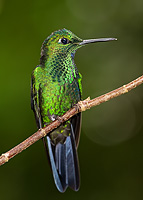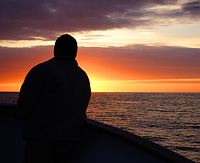Home -> Articles -> Safely Traveling With Camera Gear
Traveling Safely with Camera Gear
Tips and Techniques to Safely Travel with Camera Gear
written by Greg Cope
Traveling, Camera Gear, and Safety - Traveling with camera gear is a necessity for many of us, yet keeping one's valuable camera gear and photos safe while travelling requires concious effort, planning, and forethought. Theft from a hotel room, car, or off your shoulders can quickly turn a good trip into a bad one, as can mishaps such as lost luggage containing any or all your photography gear. While we cannot completely prevent camera gear damage or theft, we can take measures to prevent and deal with it should it unfortunately occur.

Traveling in Costa Rica I carried my SLR camera, 4 camera lenses, a backup point and shoot, and several accessories allowing me to take this photo with my 70-200mm zoom lens.
Choose Wisely - Not all photography gear is necessary for particular travel plans. Sometimes, a point-and-shoot camera is all that is needed and is much more readily concealable. If an SLR camera is a must, some camera lenses and/or equipment may not be necessary, depending upon your destination. Do you need the telephoto lens? Do you need the macro lens?
Camouflage - There are some techniques which help to physically hide and/or camouflage your photography gear. For instance hiding brand names, recognizable parts, or just making your camera gear look old and worthless. These techniques include but are not limited to:
- Duct Tape: duct tape makes your camera gear look ragged, old, and barely functional.
- Electric Tape: Placed over emblems to conceal the make of your camera gear.
- Fabric: Some equipment, for instance Canon's white 'L' lenses, are an instant eye catcher. A few rubber bands, some cheap black fabric and voila, instant camoflage.
- Backpack: A backpack specifically taylored for camera gear can be an eye catcher. While a simple run-of-the-mill backpack may be much less convenient, it does not flaunt that you may be carrying expesive photography gear. Padding typically found in camera backpackes can be taylored from clothes, fabrics, and/or cheap camping sleeping mats.
Physical Bariers - Several products on the market help to physically protect your camera gear from common criminal tactics. Some manufactors sell camera straps listed as 'slashproof' - resistant to knifes attacks in which a thief cuts your camera strap. Metal mesh bags are available that lock onto a physical object. These 'bags' encapsulate a backpack or other items and can lock them onto a immovable object, helping to prevent a grab and go type of theft. These types of barriers make a thief put in more work to grab your gear. While I cannot vouch for their efficacy, making your gear harder for anyone else to get is a good thing when it comes to theft protection. Some hotels offer in-room safes, and this could be added to the list of requirements when searching for lodging. These safes can be used to store, in addition to important items such as credit cards and passports, memory cards, smaller pieces of gear, and photo backups.
Behavior - While sometimes we cannot help but look like a tourist, we can try to alter our behavior to avoid looking like a 'mark'.
- Avoid Standing out in crowds: study your travel plans before the day begins to avoid looking at tourist books or maps through the day, try to familiarize yourself with your environment, and don't flaunt items such as smart phones, credit cards, and of course camera gear.
- Be positive and act positively. Try to get to know the locals.
- Observe your surroundings: notice who's around you, watch how others behave, and even do so from afar before diving into the crowd.
Insurance - Insuring your camera gear won't protect it from a thief, but it can help offset the cost of replacing your photography gear should it get stolen. Moreover, some insurance plans cover damaged gear - helpful should you accidentally drop a lens or camera gear gets damaged enroute. While many insurace companies offer dedicated plans for items such as camera gear, other common plans - such as renters insurance - may provide the necessary coverage of camera gear without the need to purchase a whole new plan1.
Backup - The loss of gear is one thing, however the loss of photos on memory cards can be a whole different story. Many photos are priceless and irreplacable. To protect from this type of loss, you can diversify you storage. Small hard-drives with memory card slots can be found relatively cheaply and provide a way to backup the day's photos. Their size allows one to strategically place them in diverse locations (hotel safe, money belt [presuming it fits comfortably], etc...). When high speed internet access is available, upload all (or selected photos if the the volume is too large) to an online backup system such as a website or cloud service.
Enroute - Lost luggage when traveling airlines can be an unfortunate circumstance, especially with all camera gear stowed away in checked bags. When possible, carry photography gear in carry-on luggage, and when possible avoid overhead compartments which can not only shift but items can easily fall out. If placing some camera gear in luggage is necessary, try to pack only non-essential camera gear or camera gear more readily carried in lugage (for instance tripods). Lastly, pad camera items in luggage as much as possible to prevent any damage, and well padded hard case luggage may help protect items.
Conclusion - While none of these techniques alone or together can eliminate the risk of damage or theft, they certainly can help detour a thief. Precautions such as photo backups and insurance can provide help should one become the victim.
For questions or comments on this article, please contact Greg Cope.
Other Resources on Traveling Safety:
US State Department - Safe Travel Tips.
Travel Safety - Travel Tips from usa.gov.
1Check with your insurace provider for specific coverage
2None of these techniques are guarateed. Greg Cope and Nature Focused accept no responsibility in the event of losses or damage.
